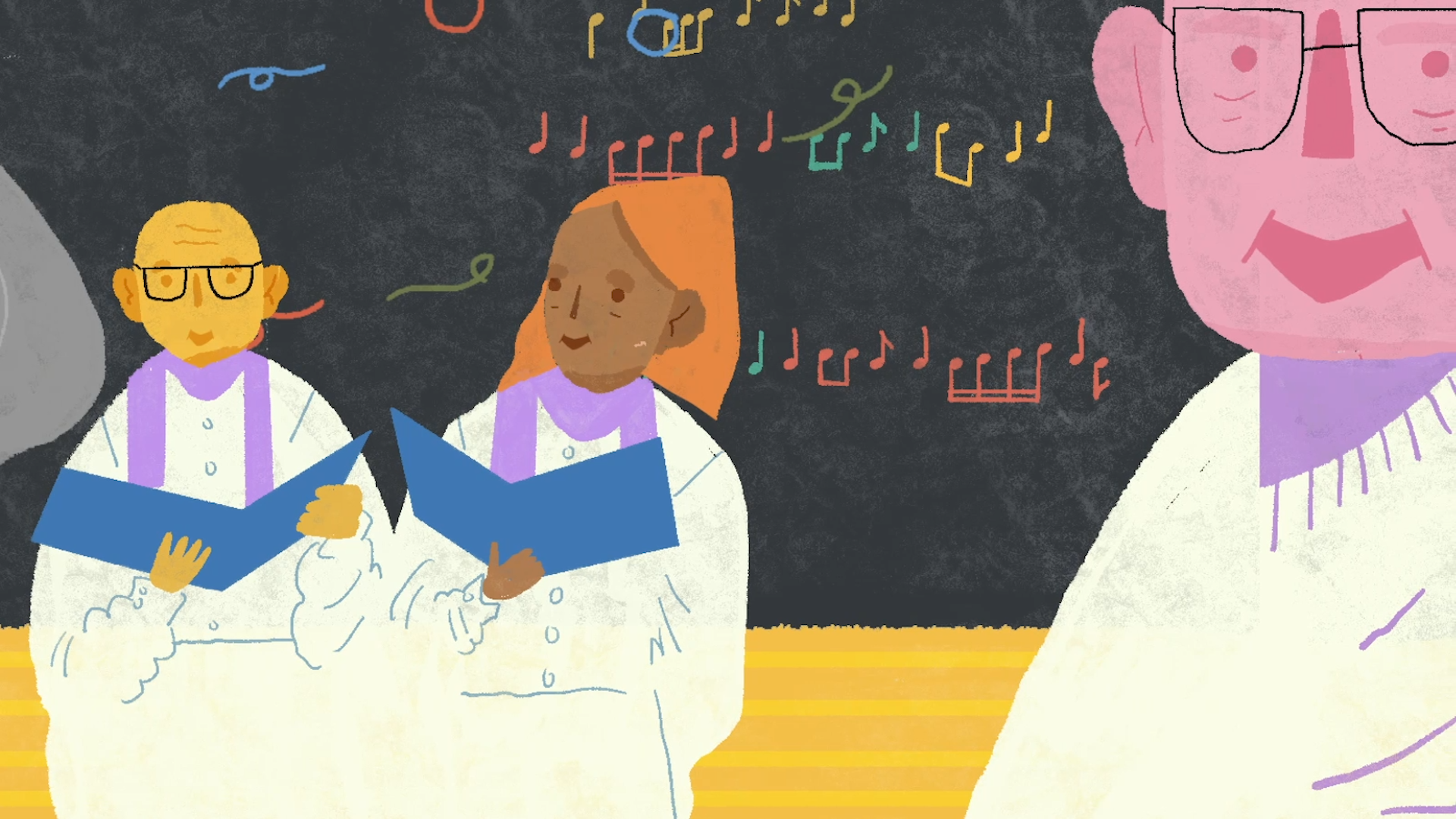The Lindens also work behind the scenes to make rehearsals run smoothly. Diane sets aside a couple hours every Wednesday afternoon to make individual phone calls to choir members. "First of all, you find out what their week has been and you discuss that. And if they're coming the next day and if they need an extra ride," said Diane. "That takes about two and a half hours. ... Because if I don't call, like I missed a couple one week, actually I think I was tired and they said, 'You didn't call me!'"
John explained that they usually arrive around 7:45 a.m. to set up the choir member's chairs and prepare some morning snacks for the singers. "And then I gotta get the coffee going right away. That's one of the most important things." The choir members spend the first half-hour sitting and chatting with each other; enjoying each other's company, coffee and breakfast treats.
"And [the other choir members] come trickling in about 20 to 9:00," said Diane. "And by the time 9:10 arrives, we've got chitter-chatter all over the room because they're just enjoying the fellowship of each other and being together. We've really become, I would say, a family."
Don sings in the choir with his wife Brenda. Originally, Don's only involvement with the choir was providing Brenda a ride. But after a few mornings of chatting with other choir members, he found himself staying to sing as well. "[People] come earlier every time so that they can sit and visit because they don't see some of them until the next week again," Don said.
"This socialization, of being able to sit down with people and visit across the table is huge," said Lerohl. "And they enjoy it so much."
Leorhl's previous career was in teaching. She worked as an elementary music teacher for 33 years and her favorite age group was kindergarten through grade six. "We did a lot of echoing back and forth, whether it was learning the tune or melody to a song or rhythms, that was just part of my natural training." A lot of the tactics she used in her elementary classes, she also uses for members of the Building Bridges Memory Choir. "When I was asked to be the director of the Building Bridges Choir, I thought, 'Well, okay, I have that background,' but I also attended the Giving Voice Initiative."
The Giving Voice Initiative is based in Bloomington, Minnesota. It was started in 2014 as a way to create wellbeing for people living with dementia and their care partners and to reduce the stigma around what it means to live with dementia. Eyleen Braaten is the executive director.
"For some reason, the areas of the brain where music memory was held was being impacted last when people were living with Alzheimer's," explained Braaten. "It wasn't just coming together to make music, it was the way the music itself was the vehicle for joy and empowerment, and healing And when these people got together they felt like they belonged."
The Giving Voice Chorus participated in a Health Partners study, looking at people living with dementia and their care partners. The study was conducted in two phases. The first looked at the effects of four and eight months of choir participation. And the second, examined the effects of one rehearsal. Phase one preliminary results showed an improvement in feelings of depression by 50% in care partners and 30% in people living with dementia who were tested. And people in phase two self-reported improvement in overall mood states.
"So not only did you see a significant elevation in mood or just self assessed, do you feel like you are capable of doing X, Y, and Z? It was significant," said Braaten.
But this was a very small study involving about 20 people in phase one and 25 in phase two. "So, we're doing everything we can to continue research because there just isn't enough out there," said Braaten. "Because we can tell you that their mood is improved or their cognition is improved, but we want brain stats."
Braaten shared a story about an experience of two members of the Giving Voice Chorus: "We had a really cool opportunity to perform at the Ordway in 2018. And that's a big venue and that's a lot of pressure on any performer to be under the big lights in a big venue. And we had a duet, which were actually just two good friends that were singing with us and the man was living with Alzheimer's and his friend, she was just singing with him as a volunteer, to be his partner. Before the concert, she didn't voice this to us, but she was really apprehensive because she kind of felt like, 'Why are you putting him through this? I understand you want us to sing at rehearsal and it's great and it's full of joy and I'm so glad I get to go with him every week because we have so much fun, but why do you need to put him through this performance? Because he's gonna be on stage and it's gonna be uncomfortable.' And we didn't know this at the time — she wrote us a letter afterwards — and she said when they got on stage and she saw his face light up when he saw his family in the audience, that it totally clicked why we do this. [It's] a gift that he can give his family who probably takes care of him all the time that he never gets to give back. And he was up on that stage, singing his heart out to his family and people with Alzheimer's don't get asked to do that anymore. They're always needing the care and needing the help. And so she said, 'Oh my gosh, for me, it totally clicked! Of course we have to do this because it's so important!' When these people are singing you can't tell who has Alzheimer's and who doesn't."
Braaten said that as an organization, Giving Voice wanted to create a process for choirs around the state, county and world to replicate. "So we worked really hard to produce this toolkit, sort of a step-by-step guide in how you could create your own chorus," she said.
"I like to choose music that I think is familiar. That's part of this concept," said Lerohl. "If there is a tricky rhythm or a melody or something, that's where this echo clapping ... comes in handy because when you repeat it physically, you have a better chance of remembering it.
During a rehearsal in the spring of 2022, John Linden made an announcement to the rest of the choir: Diane was in poor health and she wasn't able to move around very well. "She just wanted you to know that she's thinking about all of you and how much she loved being here and being a part of this." He said. "And all your cards, letters and especially your prayers are so welcomed. And she just wanted me to say thanks. And she loves you all."
In a visit to her home, Diane said that she's been working up the strength to visit the choir. "I think tomorrow I'm gonna go and visit the choir for the first time in all those months. And I'm coming back differently than when I left. When I left, I was this bubbly, kind of wild, 80-year-old. And now I'm going back a little bit different," she said. "I think that's one of the reasons why it's taken me a while too. But that's one of the things that bothered me. And it's not gonna bother me anymore," she said, determined.
Diane was able to gather the strength to visit the choir for a brief moment. She explained that in December, she had been diagnosed with cancer for the fourth time. "For someone who does not like this part of things, I can't imagine I'm here but I'm so thankful that I am," Diane said as she sat in her wheelchair in the front of the choir, John standing behind her. "But you know what? The one thing I knew for sure was that all of you were praying for me and I appreciate that so much," she said to the group. "I just wanted to know that I don't think I would've made it without your prayers, and I mean that. Sincerely. So thank you, thank you, thank you very much. And gee, by the fall, when we start again, ooh, we're gonna have lots of fun!" Diane said with a chuckle.




